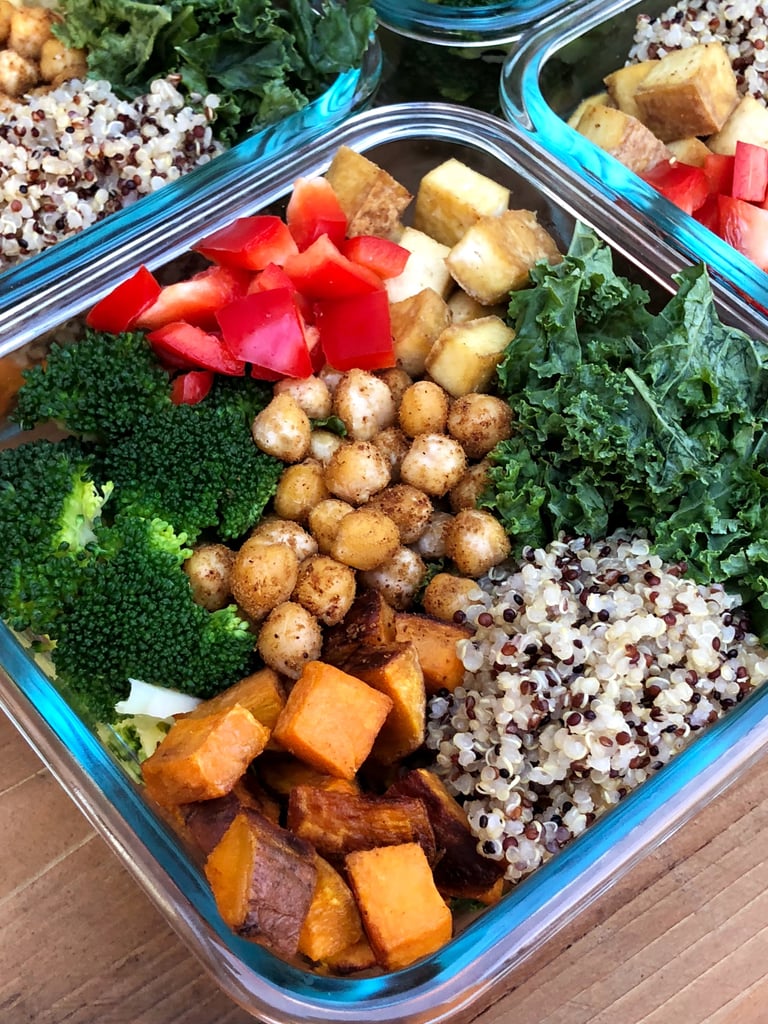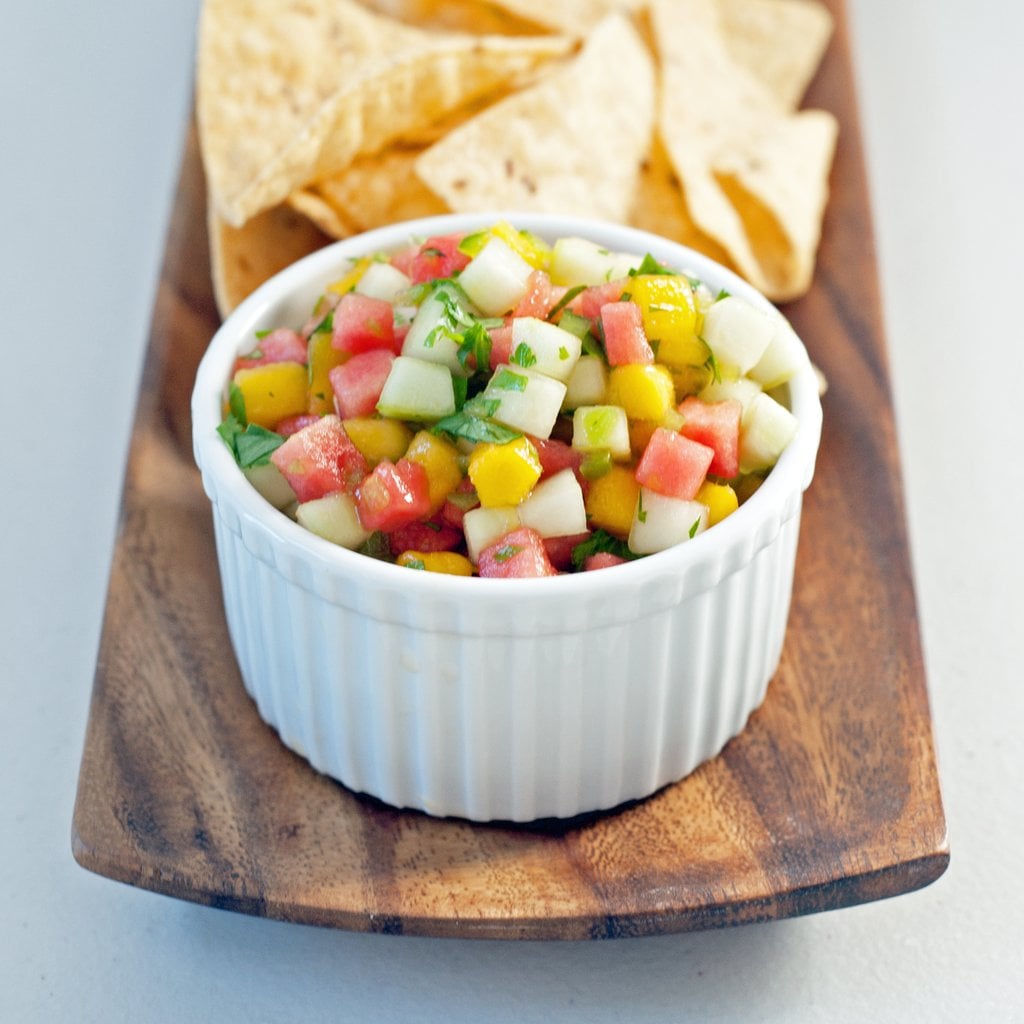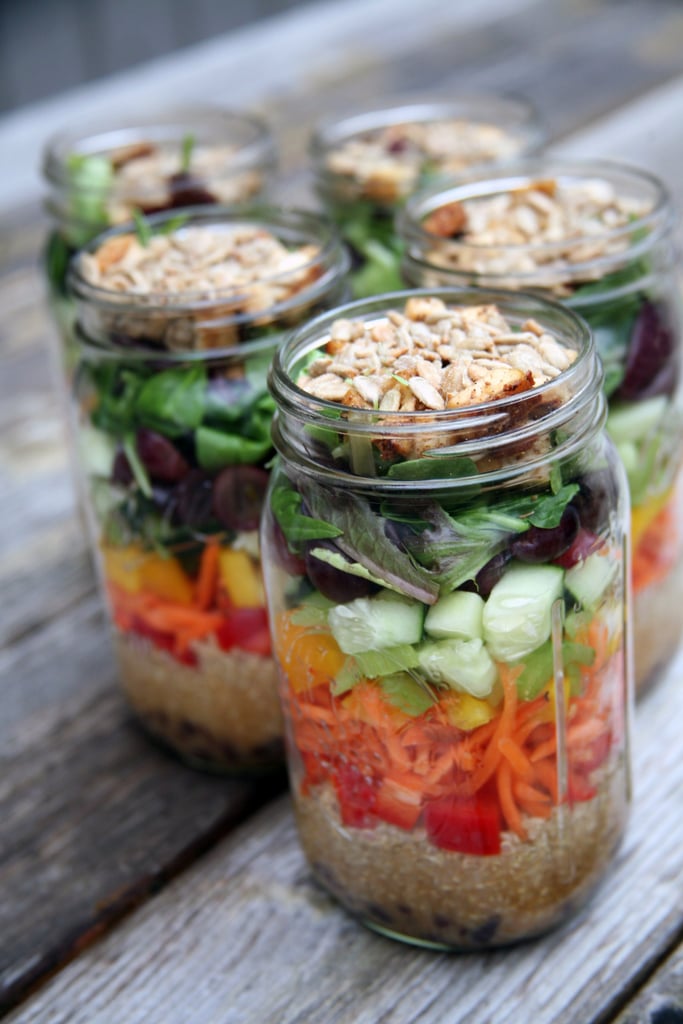When you start reducing your calories to create a healthy calorie deficit [1], you may start to feel hungry as you adjust to your new calorie intake. You don't want to ignore physical cues of hunger such as dizziness, headaches, the inability to concentrate, and extreme fatigue, but one of the reasons people struggle to lose weight [2] is because they don't eat satiating meals and instead allow themselves to feel hungry all day. This isn't sustainable and such restriction often ends in binge-eating [3] or giving up.
Fitness and lifestyle coach Marci Nevin (@marcinevin [4] on Instagram) posted nine simple, easy-to-follow eating tips to lose fat without the tediousness of having to count calories. She said that while counting calories ensures more accuracy in knowing if you're reaching your calorie goal, calorie counting isn't for everyone. Here's how you can still shed body fat "without meticulously counting every calorie [5]."
Include Protein and Veggies With Every Meal
Protein satiates hunger, and the fibre in the veggies (which tend to be low in calories) will fill you up and keep you feeling full. "Include a palm-sized portion of protein and fill at least half your plate with veggies," Marci said. Registered dietitian Leslie Langevin, MS, RD, CD, of Whole Health Nutrition [7] agreed, and tells her clients that one of the best ways to lose weight is to eat more veggies. [8]
Limit Liquid Calories and Hyperpalatable Foods
Liquid calories like soda, dessert-like coffee drinks [9], and juices carry tons of calories and sugar without any protein or fibre to satiate hunger, so you'll feel hungry soon after. You're better off drinking zero-calorie drinks like water, seltzer, black coffee, and tea.
Also limit hyperpalatable foods, specifically processed high-sugar, high-carb foods [10] like cookies, doughnuts, chips, and crackers. "You may find yourself hungry sooner than expected after eating carbs [11] that are lower in fibre or carbs that are more processed," dietitian Susannah Southern, RDN, LDN, the clinical nutrition manager at the University of North Carolina Hospitals Outpatient Nutrition Clinics in Chapel Hill, explained. Eating these foods often makes you crave them even more.
Eliminate Extra Bites, Licks, and Tastes
All those extra bites, licks, and tastes [12] can add up to hundreds of extra calories each day. Avoid noshing on spoonfuls of dinner while its cooking, eating the crusts you cut off your kiddo's sandwich, and grabbing a few M&Ms from your co-worker's desk.
Use Herbs and Low-Cal Condiments
To add flavour without tons of calories, swap creamy and high-sugar sauces and condiments for herbs, spices, and low-calorie condiments to your meals like mustard, homemade salsa [13], and fresh rosemary.
Use Your Hands as a Portion Size Guide
When constructing your meals, "aim for a palm of protein [14], a fist of starch, a thumb of fat, and a few handfuls of veggies," suggested Marci. It will automatically keep your macros balanced and portions in check [15]. If you eat three of these meals with minimal snacks every day, Marci said "you'll have an easy time getting into that deficit."
Plan Your Meals Ahead of Time
Have a few favourite go-to meals in mind that you know the basic calorie count of to reduce decision fatigue, Marci suggested. Or go a step further and meal prep all your lunches for the week like these 430-calorie mason jar salads [16].
Feel Hunger 30 to 60 Minutes Before a Meal
"Hunger is not an emergency, and a good rule of thumb is to experience that feeling for about 30 to 60 minutes before you start eating your next meal," Marci said. Obviously you want to listen to your body and eat if you feel dizzy or shaky.
Dietitians Stephanie Clarke, RD, and Willow Jarosh, RD, of C&J Nutrition [17], do not recommend disregarding intense hunger signals and waiting until you're famished to eat as that can result in overeating. But a moderate level of hunger is important [18] in order to signal to your body when it's time to eat.
Stop Eating Before You Feel Full
Down with the clean plate club! Instead of putting the fork down when your plate is bare, pay close attention to how your belly feels so you can stop eating when you're satisfied [19] but not stuffed. Think about eating until you're 80 percent full (which is about a six on the hunger scale [20]), not 100 percent uncomfortable.
Eat Slowly and Without Distractions
If you're rushing to inhale your food, watching TV, or doing work while eating, you're more likely to not feel satisfied so you reach for more food, or you're so distracted that you mindlessly overeat. Make meals a special time where you take time to sit at the table [21], eat slowly, and savor each bite. Eating without any distractions [22] will also help you recognise when you're full.
"Here's how you can still shed body fat without meticulously counting every calories," Marci said.









